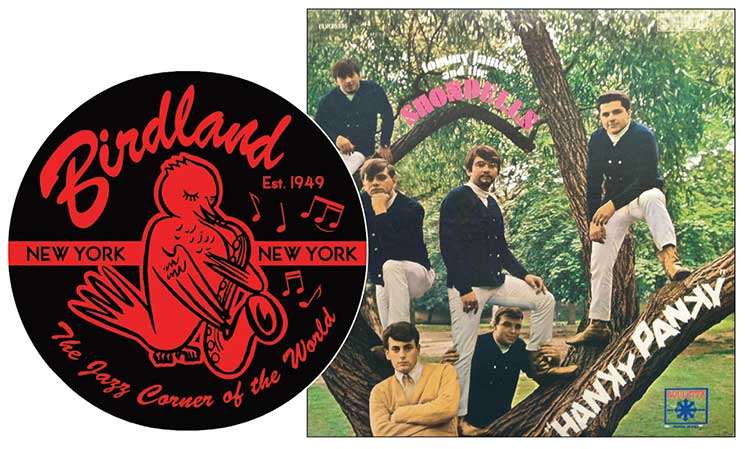The Hit Man
“The ability to wheel and deal are such essential elements of success” in the music industry, wrote the editors of Billboard magazine in November 1988, with Morris Levy in mind, that “the thin line between unscrupulous and criminal behavior is often obscure and hard to pinpoint.” Wherever that line lay, Levy often crossed it. The owner-operator of the world-famous New York jazz club Birdland during the 1950s, the head of the indie label Roulette Records throughout the sixties and seventies, the creator of the retail record store chain Strawberries during the 1980s, and the object of countless lawsuits for copyright infringement and royalty theft during most of his career, Levy was a lifelong associate (or more accurately, employee) of the Mafia, specifically, the Genovese crime family. Only his death of stomach cancer in 1990 at the age of 63 spared him from a 10-year prison sentence for violent extortion.

Pop music historian Richard Carlin comes not exactly to praise Morris Levy but at least to set the record straight. He aims to rediscover the character in the caricature. Scrupulously even-handed, Carlin eschews the sensational in favor of sober business history, meticulously detailing key aspects of Levy’s 40-year career in a business where, curiously in Carlin’s telling, Levy occupied a position both at the center and on the margins. Carlin reveals that Levy, who is usually dismissed as just a colorful parasite, was a nightclub owner committed to racial integration (of both customers and staff), an innovator in the early promotion of rock and roll concerts (partnering with legendary Cleveland disc jockey Alan Freed), an ambitious label owner who once aspired to elevate his company Roulette Records to the status of a major label, and a genuine pioneer of discount music marketing, including his virtual invention of the “golden oldie” compilation. While acknowledging that Levy had ties to mobsters from the beginning—his start in the business was as a teenage flunky in the nightclubs’ Mob-run coat-check racket—Carlin suggests that Levy remained a semi-legitimate businessman until the middle-late 1960s, when Roulette’s fortunes as a hit factory declined. It was at this point that such lifelong cronies as Genovese family boss Thomas “Tommy Ryan” Eboli and New Jersey mobster Gaetano “Tommy” Vastola virtually moved into the company’s premises, on occasion even commandeering Levy’s office for discreet high-level meetings.
Yet Carlin’s stick-to-business read of Levy’s life constricts the book’s focus almost too tightly. The author tells us that Levy was a notorious womanizer, but we learn next to nothing of his five marriages and three children, although Carlin appears to have interviewed Levy’s son Adam, who became his father’s confidant and inherited many of his many legal entanglements. Levy’s Jewishness is similarly neglected. It is of course never disguised, which would have been absurd. The music business of Levy’s day (and to an extent even today) was a Jewish niche industry; almost everyone Levy worked with who wasn’t an artist or a Mafioso was a Jew. Co-religionists and Italians alike referred to Morris as Moishe. That the Ashkenazi pronunciation was employed and that Levy himself made frequent use of Yiddish, despite the fact that he was the son of Turkish-born Sephardi immigrants, underscores the peculiar ethnic character of the music business subculture. In his 2010 memoir, Me, the Mob, and the Music, the non-Jewish Midwesterner Tommy James, who, with his group the Shondells, would become Roulette’s most successful hitmaker of the 1960s era, described his introduction to the business as one meeting after another with Jewish moguls: talent agent Chuck Rubin; head of the Kama Sutra label, Artie Ripp; Ron Alexenburg, boss of Epic Records; George Goldner, the pioneering producer of Latin mambo recordings; and Jerry Wexler, co-head of Atlantic Records. By the time James finally made his way to Morris Levy’s cavernous Broadway office, Levy’s promotional director, Red Schwartz, had tipped off his boss to the hit record potential of James’s song “Hanky Panky.” As James later found out, Levy had sent a message to all of these competitors to lay off. “This is my fucking record!” he told them. “Leave it alone.”
Levy is fascinating in part because he took the Jewish tough guy persona to its greatest extremes in a business in which—to paraphrase Woody Guthrie—robbery was far more frequently undertaken with fountain pen than a six-gun. A long-time contributor and fundraiser for the United Jewish Appeal, Levy was the guest of honor at a notorious 1973 dinner hosted by the organization in which the attendees raised a little short of $500,000, “with additional pledges still uncounted,” as the evening’s emcee, former Boston disc jockey and Elektra Records president, Joe Smith, reported. Smith went on to extend his own personal best wishes to “Moishe, a man I’ve known for many years, admired, and enjoyed.” To uproarious laughter he then hastily added, “And I just got word from two of his best friends on the West Coast that my wife and two children have been released!” Although Levy could be thin-skinned, he made little effort to downplay his notorious reputation. On the contrary, it usually made actual violence unnecessary. At times the mere mention of Levy’s name proved sufficient to persuade attorneys to back down from lawsuits urged on them by disgruntled artists he had cheated.
But Carlin also shows that a number of musical acts sought out his sponsorship precisely because Levy had the power to move mountains. In the Hobbesian universe that was the indie record business, Levy had a rare capacity to get things done. The very definition of an indie label was its institutional separation from an in-house distribution network that could circulate its product over wide regions of the country where retailers and potential customers might await. On the off chance of a possible national hit, such networks had to be cobbled together piece by piece. This required not only capital and contacts, two assets Levy possessed in abundance, but also persuasion. And no one was more convincing than Morris Levy. Carlin provides an example of this late in Levy’s career when the shoestring black-owned operation called Sugar Hill Records—essentially the first rap label—utilized Levy’s services to create distribution for a recording haphazardly concocted by a collection of amateurs called The Sugarhill Gang. Levy deserves full credit for making that record, “Rapper’s Delight,” not just a national hit in 1979, but also a breakthrough in the emergence of a revolutionary new genre.

Artists so lucky would have to content themselves with soaking up the glory of momentary fame. Fortune was an altogether different matter. Levy was notorious for refusing to pay artist royalties. “You want royalties? Then go to England!” he loved to say. Most indie label owners were stingy with royalties. They seemed to feel—perhaps not without reason—that a record’s success was due at least as much to their own investment and bribery as to the musician’s actual talent. In exasperated response to accusations that he had stolen musicians’ royalties, record label owner Don Robey once asked, “How can these ignorant sons of bitches think I owe them money because they hear their record on the air? Hell, I paid the deejays to play it!” But Levy, even more than most, seemed to regard such demands as personal affronts. As Tommy James remarked, the only royalties Roulette regularly paid were those “owed to that famous songwriter Morris Levy.” Like most of his cohort, Levy was not above claiming songwriting credit on his artists’ hits. Called upon in court to explain how he contributed to the epic hit “Why Do Fools Fall in Love” by Frankie Lymon and the Teenagers, a group Levy had met only months after the song had been recorded, Levy outlined his own creative process: “You get together, you get a beat going, you put music and words together. I think I would be misleading you if I said I wrote songs, per se, like Chopin.”
Levy excelled at such Runyonesque bon mots. But what was it that really set him apart from such other larger-than-life Jewish record men as Leonard Chess of the eponymous Chicago label, Syd Nathan of King Records in Cincinnati, Jules Bihari of Modern Records in Los Angeles, and many others of their kind? One answer is that each of those labels had a distinctive identity, a characteristic sound. Levy’s Roulette produced hits, but there was no Roulette sound.
In business, Levy was more of an agglomerator than an innovator. As Carlin points out, he preferred to invest in small, financially troubled companies rather than provide loans to their overextended founders. Employing his leverage as part owner, he would then install one of his allies to monitor his investment, from which position the operation would be bled of capital and talent until Levy could gobble it up at an affordable price. In this manner Roulette subsumed some of the more notable New York City labels of the era, particularly those founded by the brilliant but gambling-addicted George Goldner. What Levy craved even more than the label artists themselves were the copyrights and catalogues the labels contained. “Copyrights don’t talk back,” he liked to say. As he advised the young producer Quincy Jones, “publishing is where it’s at.” Levy was a genius at recycling the songs he owned through “remainders” and discount compilations whose advantages lay not just in their marketability to thrifty nostalgia buffs but in the legal loopholes surrounding their re-usage that ensured no royalties had to be paid to artists. Less than a decade after his death, Levy’s thousands of copyrights were valued at around $200 million.
In the end the “Godfather of the music business” fell victim to his own greedy machinations. Carlin devotes large chunks of the two concluding chapters to detailing Levy’s bumbling conspiracy to defraud a small-time operator of the records he thought he’d been wholesaled, as well as the lengthy trial that followed. It is an episode worthy, if not of a Scorsese film then at least of a Jimmy Breslin novel. Levy and his compatriots were truly dangerous men, but the FBI was quickly onto them, taping their conversations and anticipating their plans. Carlin’s meticulous telling adds further details to previous accounts, such as William Knoedelseder’s Stiffed: A True Story of MCA, the Music Business, and the Mafia. Yet in the end one is left with a longing for something more.
Carlin has captured Morris Levy the criminally insatiable businessman, but he doesn’t do much to reveal Levy’s soul. One anecdote comes close: After songwriters Nile Rodgers and Bernard Edwards of the 1980s disco band Chic sued Levy for copyright infringement of their song “Good Times” (which had been heavily interpolated in “Rapper’s Delight”), Levy agreed to pay them a substantial sum, but on one condition: They had to buy him two round-trip tickets to Paris and a pair of his-and-hers Rolex watches. When their incredulous attorney asked him why, Levy made it clear that it was a fundamental matter of pride. “Come on,” he replied, “I gotta fuck ya!”
Suggested Reading
Father Abraham
Jews, Muslims, and Christians all revere Abraham. But is it the same Abraham?

Missing Notes
There was a time when Jewish artists set the tone for North African music, but now only echoes remain.

Ten Plagues, Three Acronyms, Seven Opinions
The story behind everyone's favorite Pesach mnemonic.
What a Friend We Have in Jesus
A new crop of books about Jesus, by Jews and for Jews.
Comments
You must log in to comment Log In